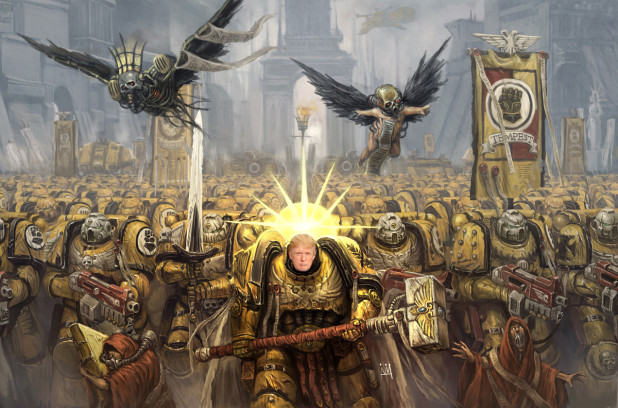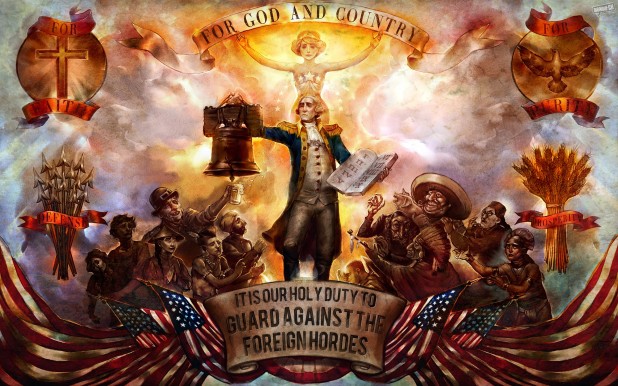Kevin MacDonald
Occidental Observer
January 26, 2016
The National Review assault on Donald Trump brings up the issue of basing one’s political views on values, ideas, and principles. The problem is simply that these abstractions may or may not reflect fundamental interests, and the Trump candidacy is bringing this to the fore. The NR commentary is essentially a brief for the priority of principles, ideas, and values over interests. NR editor Rich Lowry sums up the theme:
If you truly are conservative, you believe in ideas and in principles, … It’s not just attitudes. It’s not just who you dislike. It’s limited government. It’s the Constitution. It’s liberty. Those are the things that truly make this country special. And they are basically afterthoughts to Donald Trump. He almost never talks about them.
For Lowry, the contrast is between ideas and principles versus not liking someone (?!). Concerns about “limited government” and respect for the Constitution are the main themes running through the comments. Trump just hasn’t been mouthing adherence to either of them, and his critics point to instances, mainly in the past, where he has strayed from these abstractions. (Yes, the Constitution is an abstraction, because as Joe Sobran said (and quoted by Gregory Hood), “the Constitution poses no serious threat to our form of government.” It follows from this, and it is certainly true, that the Constitution does not pose any serious threat to the eclipse of White America.)
In all of this, there is no mention of fundamental interests that might be compromised by adhering to the principles they espouse. As I noted in a recent article on the response to Trump, “Conservatism Inc. may argue that Trump is not a ‘conservative.’ But the reality is that Trump voters are focusing on his big issues—immigration first and foremost. Unless we win the immigration battle, none of the other battles can possibly be won.”
Immigration, more than any other issue, reflects fundamental interests in the ethnic composition of the United States. As an obvious example, limited government is not going to repatriate millions of illegal immigrants, or keep them out in the future. It is an enduring Utopian ideal that limited, constitutional government and individual freedom can survive importing millions of people from radically different cultures—cultures with no history of limited, constitutional government or individual freedom, and often with hatred toward the peoples and cultures of the West. Only the most reality-detached ideologue could believe that it’s all going to work out and something resembling traditional American institutions will be around in a few decades time if current trends continue. As Jared Taylor points out, “Do they really believe that Mexicans and Haitians and Guatemalans and Vietnamese and Bangladeshis and Chinese are ever going to be made to care about the Second Amendment or Madisonian democracy or limited government?”
This mindset among NR conservatives reflects a common defect among liberal Protestants that surfaced originally in the nineteenth century — the idea that the very different people crowding the shores of the U.S. would become “just like us.” These immigrants would eventually become good Protestants. What we are seeing now is how important segments of non-White immigrants, most obviously Muslims, are in fact unassimilable. They are never going to “become like us” and be concerned about the principles and values so near and dear to conservatives. It was the realization that so many of the post-1890 immigrants were infected with radical political beliefs that finally made Americans realize that immigrants don’t automatically turn into patriotic Americans. This realization was an important impetus for the 1924 immigration law.
It’s obvious that importing millions of non-Whites has resulted in increasing pressures directed squarely at some of the sacred principles conservatives claim to value, in particular pressure for controls on speech and thought resulting from the need to knuckle under to aggressive minorities that don’t take criticism kindly, no matter how factually based. This is especially the case in universities and the media, where violators of multicultural decorum are routinely harassed and fired. But intellectual rationales for curtailing speech critical of the multicultural ideal are already common in the legal community in the U.S., while in Europe, police-state controls on thought and behavior intended to buttress the the multicultural revolution are firmly ensconced. For Germany reeling under the migrant onslaught, the first priority is to manage nativist anger, not restricting migration or repatriating migrants. And throughout the Western world, there is increased surveillance because of terrorism threats resulting ultimately from immigration.
Although the San Bernardino shootings and the long list of terrorist incidents prior to that certainly focus the public’s attention one of the costs of massive unselected immigration, the far greater problem is that massive immigration leads to a loss of a sense of national identity as bound up with a particular people and culture. There is an elite consensus that citizenship is simply a matter of accepting basic principles of democracy and individual freedom — the “proposition nation” concept of citizenship — rather than protecting the interests of a particular people. The ideology of the proposition nation is now a consensus among political and intellectual elites throughout the West, and certainly “conservatives” are no exception.
We have to understand that this way of thinking is the result of the counter-cultural revolution of the 1960s, the intellectual basis for which is discussed in The Culture of Critique. In CofC I discuss a paper by Roger Smith, who shows that until the triumph of the cultural pluralist model with the countercultural revolution of the 1960s, there were three competing models of American identity: the “liberal” individualist legacy of the Enlightenment based on “natural rights”; the “republican” ideal of a cohesive, socially homogeneous society; and the “ethnocultural” strand emphasizing the importance of Anglo-Saxon ethnicity in the development and preservation of American cultural forms.[1] These three strands are compatible with each other, but only if the US had retained its traditional homogeneous White underpinnings. Recall that the Immigration Restriction Act of 1924, with its built-in sense of White identity politics (i.e., biasing immigration to people from Northwest Europe), was essentially upheld over presidential veto not that long ago, in 1952. Yet these principled conservatives act as if their ideals have always been the guiding principles of the Republic. Fundamentally, they have plugged into the leftist zeitgeist in order to make themselves palatable to the powers that be — or, in the case of the rather large percentage of Jewish neocons among the NR essayists, they have simply passed off their leftist impulses and ethnic interests in a non-White America as the true conservatism.
The problem is that these self-described conservatives have thrown out all of this except the Enlightenment ideals. By denigrating and religiously avoiding the traditional ethnocultural strand of American identity as well as the republican ideal of a cohesive and socially homogeneous society, these “conservatives” have wholeheartedly gone along with this revolution. It is a revolution that amounts to the suicide of the West. In the end, it is anything but conservative.
The outcome of the present policies is utterly predictable decline in social cohesion, with far-ranging costs in terms of increased conflict and crime, and a lessened willingness and ability to contribute to public goods such as welfare and health care. It’s well known that ethnic diversity is correlated with a host of undesirable outcomes. People in ethnically diverse societies invest less in social capital, they cooperate less, are less prone to engage in volunteer work, and there is less trust among citizens.
Given all that, how can any rational person suppose that a set of principles, ideas, and values that result in all of these costs to the White population of the U.S. could be anything other than a suicide wish in the present political context? Immigration is the bedrock issue. Nothing else matters. The lack of concern about immigration in favor of principles and values is a deadly flaw in conservatism as promoted by Lowry et al. If the NR conservatives would have their way, immigration would not even be an issue in the campaign. If nothing else, we all have to thank Donald Trump for putting it front and center in the public consciousness.
Several of the comments reflect a concern that, far from being a small-government conservative, Trump represents a kind of veiled fascism:
- In a comment that assumes that Trump wants absolute power, Yuval Levin: “American conservatism is an inherently skeptical political outlook. It assumes that no one can be fully trusted with public power and that self-government in a free society demands that we reject the siren song of politics-as-management.”
- William Kristol: “Isn’t Trumpism a two-bit Caesarism of a kind that American conservatives have always disdained?”
- Ben Domenech: Trump “advocates is a rejection of our Madisonian inheritance and an embrace of Barack Obama’s authoritarianism.” (Elsewhere Domenech writes that Trump “would throw the Constitution and the rule of law to the winds in pursuit of an aggressive promise of unilateral change – and [his supporters] are fine with that.”)
- R. R. Reno: Trump “presents himself as a Strong Man who promises to knock heads and make things right again. In this, he has a lot more in common with South American populist demagogues than with our tradition of political leaders.”
- David Boaz: “Trump’s greatest offenses against American tradition and our founding principles are his nativism and his promise of one-man rule. … He’s effectively vowing to be an American Mussolini, concentrating power in the Trump White House and governing by fiat.”
- David McIntosh: Trump’s policy ideas are “the ramblings of a liberal wannabe strongman who will use and abuse the power of the federal government to impose his ideas on the country.”
There is essentially zero evidence for any of this. But underneath such sentiments is a guilty conscience—the realization that establishment conservatives have done nothing to stem the actions of our hostile elite in running roughshod over the interests of White America in maintaining its political and demographic hegemony. Indeed, in many ways, despite their rhetoric, they are a major part of our hostile elite. Several of the essayists acknowledge that there are very real grievances underlying the anger so many White Americans feel, including the failure of Republicans to do anything to stem the anger and frustration of its base (see especially Domenech and Reno). But their prescription is that these extremely frustrated, angry (White) voters reject Trump and pledge allegiance to principles of individual freedom, limited government, the free market, etc., and hope for the best, even though they can’t explain how these principles would do anything to assuage their deeper concerns. Indeed, these principles are sometimes used as a rationale for the immigration onslaught, as with David McIntosh of the very pro-immigration, philosophically libertarian, free trade-obsessed Club for Growth.
It’s like they are saying, “Okay, we haven’t done anything to help you out and we can’t explain how subscribing to principles of freedom and limited government would really address your concerns over how immigration has transformed the U.S. But please don’t vote for the only person who is even discussing these concerns.”
Nobody’s listening, apart from the Beltway conservatives who are plugged into the Conservatism, Inc. gravy train.
If we are in fact seeing the beginning of a politics of more-or-less explicit White identity, the irrelevant cuckservatives at at the dying NR must receive a great deal of the credit. And for that we can be thankful.
[1] Smith, R. M. (1988). The “American creed” and American identity: The limits of liberal citizenship in the United States. Western Political Science Quarterly 41:225–252.





